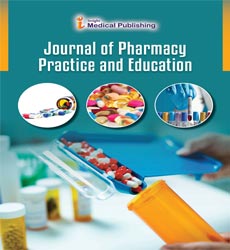The Role of Pharmacy Practice and Education
Ali HS*
Department of Pharmaceutics, College of Pharmacy, Dubai Pharmacy College, Dubai, UAE
- *Corresponding Author:
- Ali HS
Head of Department Pharmaceutics
Department of Pharmacy, Dubai Pharmacy College, Dubai, UAE
Tel: +9714-212305
E-mail: heyam@dpc.edu
Received date: October 27, 2017; Accepted date: October 28, 2017; Published date: October 28, 2017
Citation: Ali HS (2017) Role of Pharmacy Practice and Education. J Pharm Prac Edu 1:3.
Copyright: © 2017 Ali HS. This is an open-access article distributed under the terms of the Creative Commons Attribution License, which permits unrestricted use, distribution, and reproduction in any medium, provided the original author and source are credited.
Editorial
Pharmacy practice in education play a great role in the pharmacy profession, where the journal will provide the Professional Information for students, graduates, practitioners in the field health care which will improve the quality of pharmaceutical services in hospitals and community pharmacy settings. Therefore, the aim of the journal will address different knowledge of concepts in the pharmaceutical care services in all sectors including community pharmacy, hospital pharmacy and even industrial area as well such as: high risks and special groups (pediatric and geriatric populations as well as pregnant women), Pediatric and geriatric aspects pharmaceutics, dispensing of cytotoxic drugs, some OTC agents, the pharmaceuticals and health care accessories, cosmetics and personal care, IV admixtures and some incompatibility encountered in pharmacy practice, determination of the rate of flow of IV fluids, Non-prescription medication, reconstitution of dry powder and calculations including prefabricated dosage form, Total parenteral nutrition (TPN), prescription commonly needed in community pharmacy and researches in aiming to improve the pharmaceutical care, pharmacy practice and education that will improve the health care system and high quality of pharmaceutical care delivery.
It is well known the evolving of the contemporary pharmacy profession, where the role of the pharmacist has changed from product focus to patient centered care. To attain high level of patient counseling and professional communication, the pharmacist should be able, to master online computer skills, to be independent lifelong learner and to work coherently and successfully as a part of a team in health care groups. Pharmacist needs to acquire knowledge to advice patients on the safe and effective use of OTC drugs and to teach the other health care member how to deal with several problems such as handling correctly cytotoxic drugs and their preparation. In addition to participation with health professional colleagues in clinical decisions, presentations, conferences and seminars, with strong commitment to values and ethics of the profession in all social behaviors and practices.
Moreover, in order for the pharmacist to attain high level in pharmaceutical care delivery, have a contribution in research to solve health care problems, he/she needs to find and assess information concerning pharmacy practice quickly and reliably, to analyze, evaluate and interpret problems, to apply the knowledge of pharmacy related topics in prescribing OTC drug for patients suffering from diarrhea, constipation, GERD and common cold, to make the proper calculation for extemporaneous preparations and total parenteral nutrition (TPN) for different patient groups.
Recently, all years, institutions of higher education across the country, and internationally, have recognized the importance of pharmacy practice education. With a full commitment to professional practice in community pharmacy, hospital pharmacy and industrial training.
While there is certainly a strong external drive to pharmacy practice education, hence, courses being offered focus in knowledge and skills to equip students with all competencies required in in the profession. To achieve that educational goal of pharmacy practice courses, all learning outcomes are articulated to address the pharmacy profession as patient orientation issues, as well as outcomes assessment approaches to assure achievement of the educational goal.
Open Access Journals
- Aquaculture & Veterinary Science
- Chemistry & Chemical Sciences
- Clinical Sciences
- Engineering
- General Science
- Genetics & Molecular Biology
- Health Care & Nursing
- Immunology & Microbiology
- Materials Science
- Mathematics & Physics
- Medical Sciences
- Neurology & Psychiatry
- Oncology & Cancer Science
- Pharmaceutical Sciences
